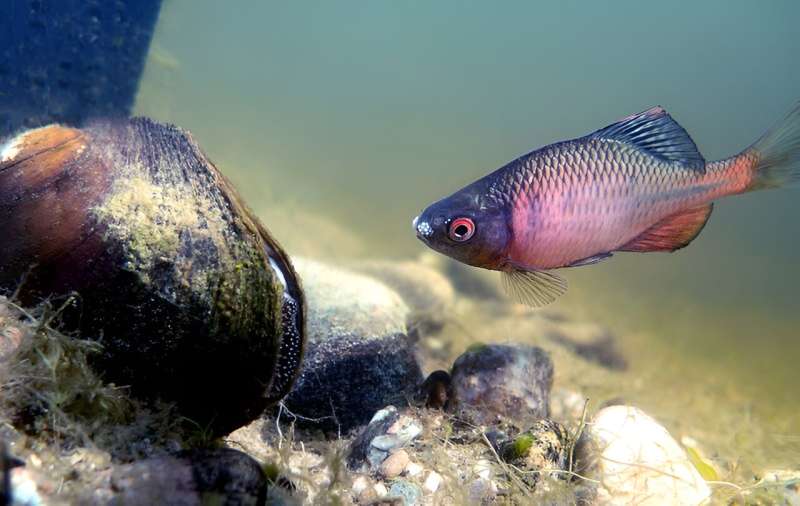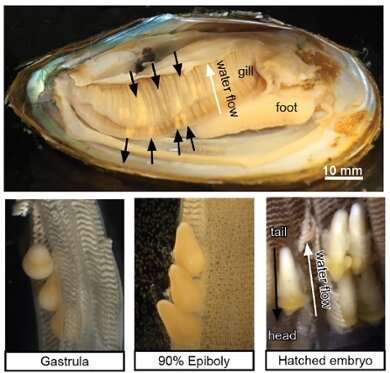This article has been reviewed according to Science X's editorial process and policies. Editors have highlighted the following attributes while ensuring the content's credibility:
fact-checked
peer-reviewed publication
trusted source
proofread
Early natural selection in vertebrates: Bitterling embryos perform somersault to secure hold on mussel host

Even embryos can become embroiled in an evolutionary arms race with another species. Leiden biologists demonstrate this with larvae of the rosy bitterling that parasitize the gills of freshwater mussels. They published their research on February 19 in Proceedings of the National Academy of Sciences.
Scientists believed that embryos had some sort of evolutionary privilege. Embryos only need to develop adequately until birth; only after that would selection pressure arise on traits such as being more adept at catching prey, having better camouflage, or being remarkably attractive to the opposite sex.
Being the host is not in the interest of the mussel
There appear to be exceptions, at least with parasitic embryos. Bitterlings are freshwater fish, and the females lay their eggs with their tube-like "ovipositor" in the gill cavity of a freshwater mussel. The male releases his sperm near the inflow opening of the mussel. The larvae stay in the mussel for a few weeks until they are about a centimeter long.
This is not in the interest of the mussel, as the larvae consume its food and oxygen and may damage the gills. To limit these "fitness costs," the mussels have developed a counter-strategy. They occasionally flush their gills with a sudden, strong water flow. The stronger the flow, the less trouble a mussel has with parasitic larvae. Unless they are firmly attached and not easily washed away.

The rosy bitterling (Rhodeus ocellatus) seems to have developed tactics to remain firmly attached when the mussel flushes its gills. First, the eggs have more of a light bulb shape, instead of a sphere like other bitterlings. And after hatching, the yolk sac forms a sort of anchor, allowing the larva to stay firmly attached.
But there's more to it. Developmental biologist Wenjing Yi last year defended her thesis on research into the embryonic development of bitterlings. Her collaborators included Dr. Martin Reichard (Czech Academy of Sciences), an expert on bitterlings.
The researchers investigated why the larvae of this species all sit with their heads downward in the gill cavity of the mussel once hatched. She discovered that early in embryonic development, during the so-called blastula stage, something remarkable happens that causes the fish to assume this advantageous downward position. The embryos somersault forward over the egg yolk, a "front-flip," the researchers write.
This process must have arisen accidentally, like everything in our genetic programming. When it yielded a selection advantage, namely a firmer position in the mussel host, individuals without this adaptation were slowly but surely deselected by the powerful water flow of the mussel. Until all rosy bitterling larvae in the egg performed a somersault. "A remarkable example of early natural selection in vertebrate animals," the researchers write.
More information: Parasitic fish embryos do a "front-flip" on the yolk to resist expulsion from the host, Proceedings of the National Academy of Sciences (2024). DOI: 10.1073/pnas.2310082121. doi.org/10.1073/pnas.2310082121
Journal information: Proceedings of the National Academy of Sciences
Provided by Leiden University




















